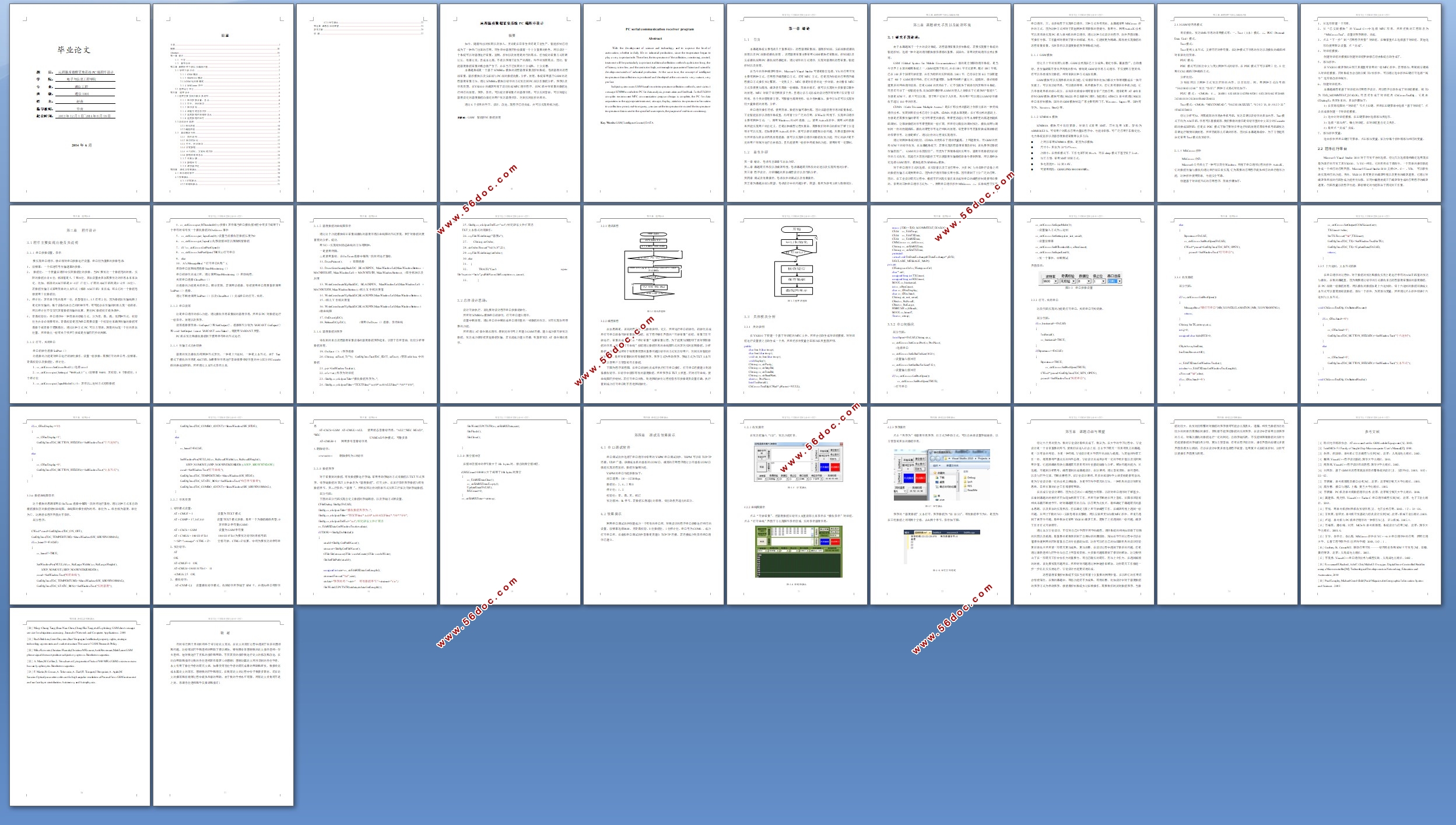远程温度数据采集系统PC端程序设计(任务书,开题报告,外文翻译,论文10000字)
摘要
如今,随着科技的发展以及渗入,无论是在日常生活还是工业生产,智能控制已经成为了一种热门主流的应用,而生活中温度同样扮演着一个十分重要的角色。所以设计一个系统可以对温度进行采集、监测、控制以及处理是时代的需求,但传统的采集方式周期过长,效率过低,且成本过高,不足以保障工业生产的高效、科学的发展需求。因此,智能温度数据采集的概念就产生了,并在当下已发展的十分成熟,十分完善。
本课题系统是一个基于SIM900a模块的远程温度采集及控制系统,包括温度的远程端采集,温控模块以及安卓端与PC端的数据收集、分析、处理。系统采用基于GSM的远程温度采集方法,通过SIM900a模块以短信的方式发送到PC端以作数据分析、保存以及信息反馈。在VS2010的编译环境下设计完成MFC通信程序,在PC机中对采集的数据进行相应的处理、保存、显示、可以统计某采集点的温度信息、可以实时查询、可以对超过温度设定的温度数据向指定的用户发送温度报告,达到实时监控的目的。
通过6个多月的学习,设计,改进,现程序已经完成,并可以实现目标功能。
关键词:GSM 智能控制 数据处理
PC serial communication receiver program
Abstract
With the development of science and technology and to improve the level of automation, whether in daily life or industrial production, since the temperature began to play a very important role. Therefore, the temperature of the collection, monitoring, control, treatment will be particularly important, traditional collection methods cycle is too long, the efficiency is too low, and the cost is too high, not enough to guarantee efficient and scientific development needs of industrial production. At the same time, the concept of intelligent temperature data collection is produced and developed at the moment is very mature, very perfect.
Subject system uses GSM-based remote temperature collection methods, sent via text message SIM900a module to PC for data analysis, preservation and feedback. In the VS2010 compiler environment MFC communication program design is complete, the PC for data acquisition in the appropriate treatment, storage, display, statistics temperature information to a collection point, real-time query, you can set the temperature to exceed the temperature temperature data is sent to the specified user reports, the purpose of real-time monitoring.
Key Words: GSM; Intelligent Control; DATA

目录 I
摘要 III
Abstract IV
第一章 绪论 1
1.1 引言 1
1.2 章节介绍 1
第二章 课题研究手段以及编译环境 2
2.1 研究手段论述: 2
2.1.1 GSM模块 3
2.1.2 SIM900A模块 3
2.1.3 GSM短消息模式 4
2.1.4 MSComm控件 4
2.2 程序运行平台 5
第三章 程序设计 6
3.1程序主要实现功能及其说明 6
3.1.1 串口参数设置、显示 6
3.1.2 打开、关闭串口 6
3.1.3 串口读写 7
3.1.4 传输方式自由切换 7
3.1.5 温度数据的曲线图显示 8
3.1.6 温度数据的保存 8
3.2总体设计思路: 9
3.2.1通讯流程 10
3.2.2编程流程 10
3.3 具体模块分析 11
3.3.1 类的说明 11
3.3.2 串口初始化 12
3.3.3 打开、关闭串口 13
3.3.4 收发数据 14
3.3.5 十六进制、文本形式切换 15
3.3.6 数据曲线图显示 16
3.3.7 信息反馈 17
3.3.8 数据保存 18
3.3.9 清空缓冲区 19
第四章 调试及效果演示 20
4.1 串口调试软件 20
4.2效果演示 20
4.2.1收发演示 21
4.2.2曲线图演示 21
4.2.3保存演示 22
第五章 课题总结与展望 23
参考文献 25
致 谢 27
|



